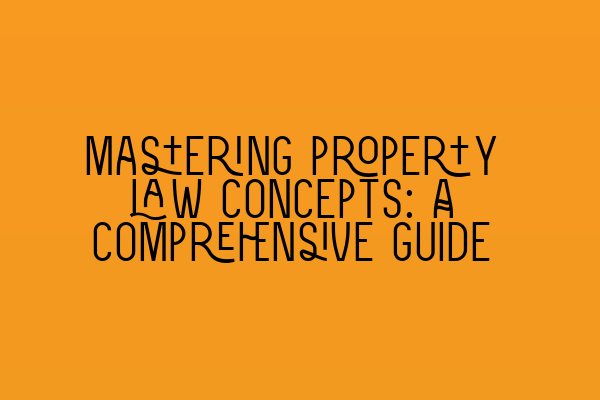Mastering Property Law Concepts: A Comprehensive Guide
Are you a student or aspiring solicitor trying to navigate the complex world of property law? Look no further! In this comprehensive guide, we will break down the essential concepts of property law, providing you with a solid foundation and helping you master this intricate area of law. Whether you are preparing for the SQE 1 or SQE 2 exams, or simply want to improve your knowledge, this guide is for you.
Before we dive into the specifics, it’s worth noting that property law encompasses a wide range of legal principles and rules that govern the ownership, use, and transfer of real and tangible property. It involves everything from buying and selling property, to landlord and tenant relationships, to the registration of property rights. Therefore, it’s crucial to have a clear understanding of the fundamental concepts. Let’s get started!
Acquiring Property Rights
The first step in understanding property law is to grasp the various ways one can acquire property rights. Generally, property rights can be acquired through purchase, gift, inheritance, or by occupation. By studying the methods of acquiring property, you will gain insight into the nuances of ownership and the legal requirements involved.
Types of Property
Property can be categorized into two main types: real property and personal property. Real property refers to land and anything permanently attached to it, such as buildings and fixtures. On the other hand, personal property encompasses movable items that can be physically possessed and transferred, like vehicles, furniture, and intellectual property. Familiarizing yourself with the distinctions between real and personal property is essential in property law.
Leasehold and Freehold Estates
A crucial aspect of property law revolves around the different types of estates. The two main estates are leasehold and freehold. A leasehold estate grants a person the right to possess and use a property for a specified period, typically through a lease agreement. On the other hand, a freehold estate confers absolute ownership of the property, without any time limitations. Understanding the differences between these estates is vital when dealing with issues such as leases and landlord-tenant relationships.
Easements and Covenants
Another key concept in property law is easements and covenants. An easement grants an individual the right to use another person’s property for a specific purpose, such as accessing a neighboring property or using someone’s driveway. Meanwhile, a covenant is a contractual agreement between property owners, outlining certain obligations and restrictions. Familiarity with easements and covenants is crucial in dealing with property development, land use, and potential disputes.
Land Registration and Title
In many jurisdictions, land registration plays a significant role in property law, stabilizing property rights and providing certainty in ownership. Understanding the land registration process and the requirements for obtaining a valid title is essential for legal professionals dealing with property transactions. It ensures the protection of property rights and reduces the risk of fraud or disputes. Knowing the ins and outs of land registration will give you a competitive edge in your legal practice.
Relevant SQE Resources
As you delve deeper into property law concepts, it’s important to have access to valuable resources to enhance your understanding and prepare for the SQE exams. SQE 1 Practice Exam Questions and SQE 1 Practice Mocks FLK1 FLK2 are excellent resources for practicing your knowledge and familiarizing yourself with the exam format. Additionally, SQE 2 Preparation Courses and SQE 1 Preparation Courses offer comprehensive materials and guidance to help you excel in your exams.
Exam Dates and Preparation
Stay up to date with important exam dates and ensure you have ample time for preparation. Familiarize yourself with the SRA SQE Exam Dates to create a study plan that aligns with your goals and commitments. Proper preparation is key to mastering property law and achieving success in your legal career.
In conclusion, property law is a vast and intricate area of legal practice. By mastering the concepts mentioned above and utilizing the related resources, you will gain a solid foundation in property law. Whether you are preparing for the SQE exams or simply aiming to expand your legal knowledge, this comprehensive guide has provided you with a valuable roadmap to navigate the complexities of property law. Remember, continuous learning and practice are key to becoming a proficient property law solicitor.
